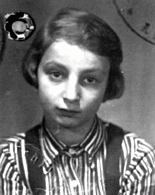
Inge Berg
Born: March 27, 1929
Cologne, Germany
Inge lived with her parents, grandparents, uncle, and younger sister, Gisella, in Lechenich, a small village outside Cologne. The Bergs were an observant Jewish family. Inge's grandfather was the president of the local synagogue association and her uncle was the cantor. Her father, Josef was a respected cattle dealer, who had many business and personal contacts with their Jewish and non-Jewish neighbors.
1933–39: In 1935, two years after the Nazis came to power, Inge was forced to leave public school in Lechenich, and attended Jewish schools in Linnich and Cologne. On November 9, 1938, the Nazis carried out a nationwide pogrom against Germany's Jews, known as Kristallnacht (“The Night of Broken Glass”). Alerted to the danger by a family friend, the Bergs fled to Cologne. Inge's mother later returned to Lechenich, only to discover that their home had been ransacked and their possessions had been damaged or destroyed. In May 1939, the Bergs left for Kenya.
1940–45: In Kenya, then part of British East Africa, the family lived on a farm in the highlands, raising cattle and pyrethrum—a flowering plant used to make insecticide. Conditions there were quite rustic. Their home had a tin roof and cement floors, and their only source of water came from the rain. Inge, Gisella, and their mother moved to Nairobi so that the girls could finish their education. To support the family, Inge's mother ran a guesthouse that quickly became a stopping point for Jewish soldiers on furlough.
In 1947, the Bergs came to the United States, and eventually purchased a chicken farm and dairy business in Vineland, New Jersey. Inge took a position in an attorney's office in New York, and, in 1951, married Werner Katzenstein, a fellow refugee from Nazi Germany.

